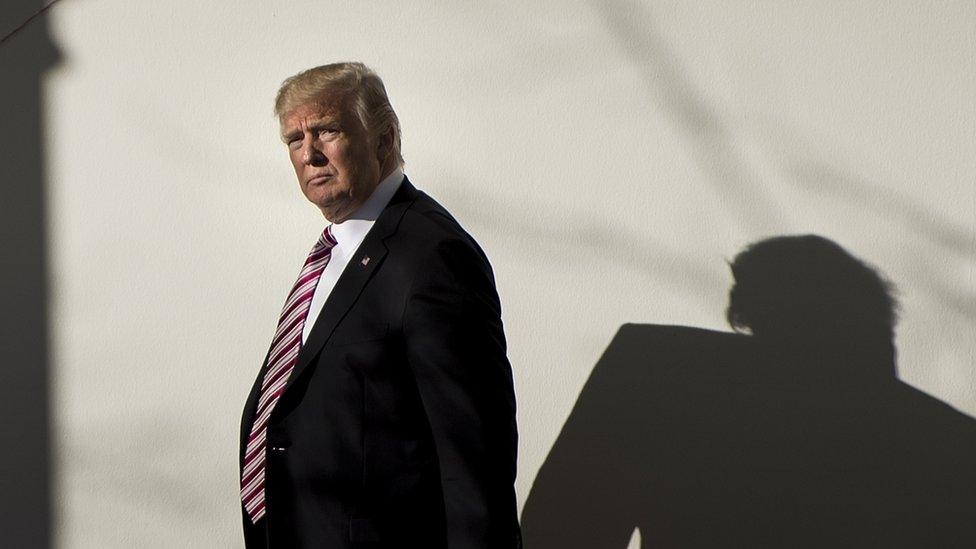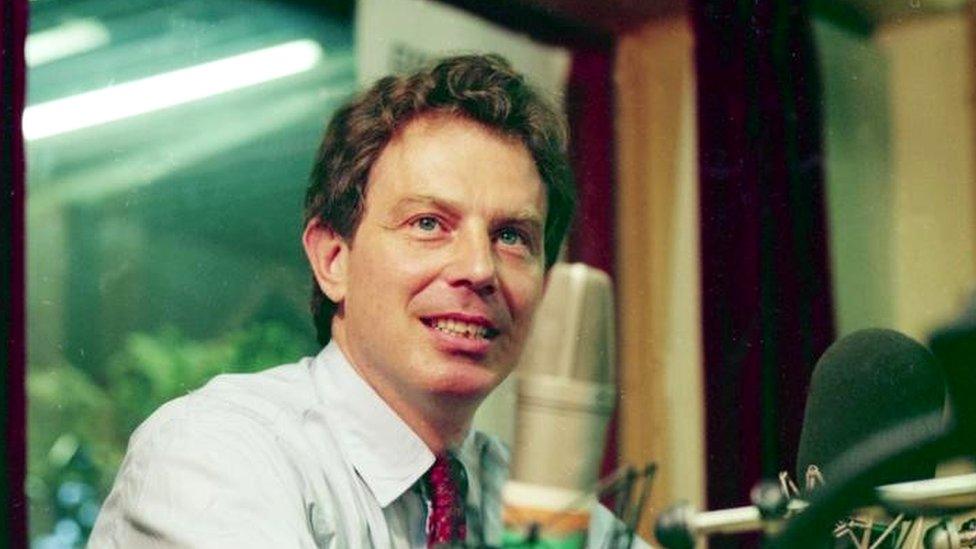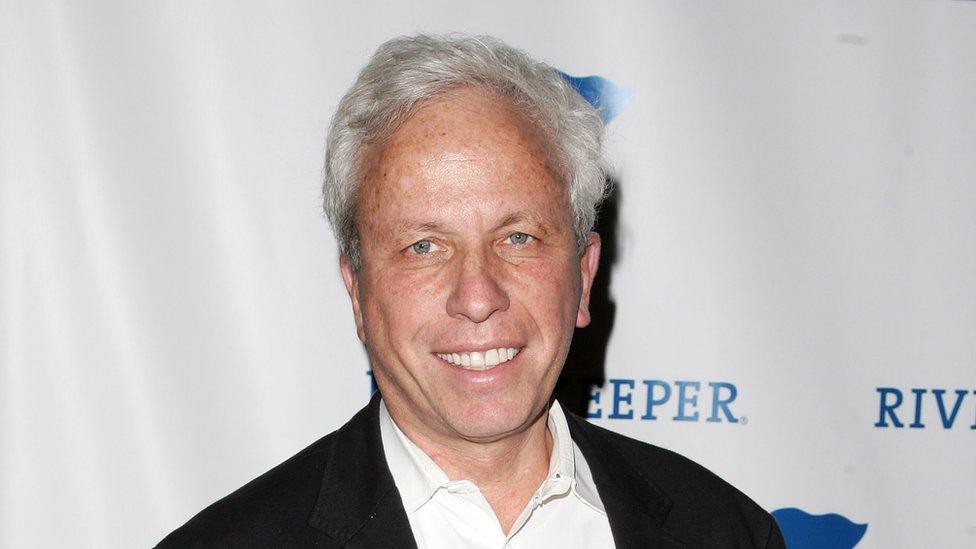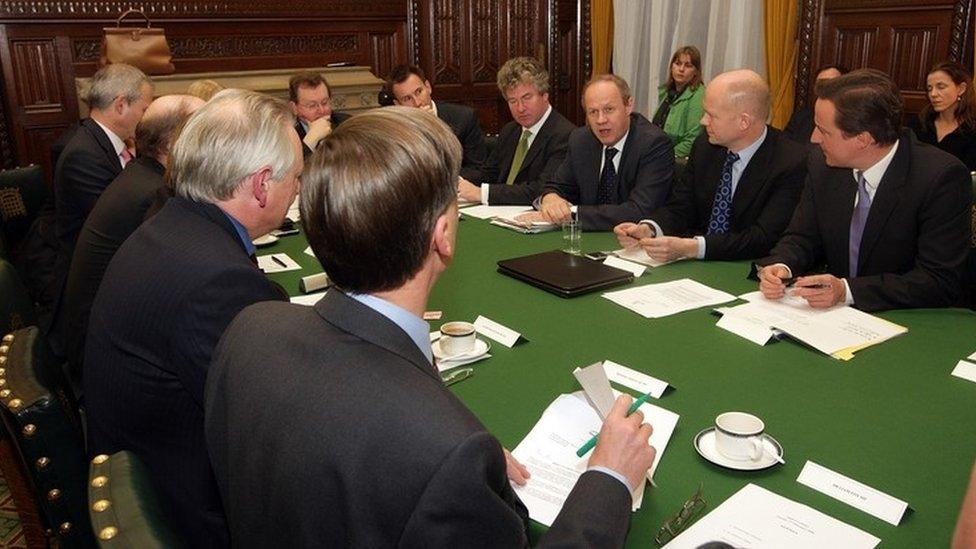How will progressive US 'shadow cabinet' challenge Trump?
- Published

A "progressive" shadow cabinet has been set up to rebut and challenge statements made by Donald Trump's administration. The "shadow cabinet" is an alien concept in American politics - so what exactly is it?
In the UK, the shadow cabinet is a team of politicians from the party that finished second in the general election, known as the Opposition, who scrutinise and challenge the government's policies.
It is a way of both holding the government of the day to account and presenting voters with a ready-made alternative government, with its own set of policies.
All cabinet ministers - and many junior ministers - have an Opposition shadow, with whom they do battle in Parliament and in the TV studios.
The current shadow cabinet, headed - and chosen - by Labour Party leader Jeremy Corbyn, has more than 30 members. They are given public money to hire researchers and develop policy - and time in Parliament to rebut government statements.

Tony Blair made his name as a shadow minister
Other parties can, and do, set up "shadow cabinets", but they do not have the same status or resources as the Opposition team.
If the Opposition party wins the next general election, the shadow cabinet, sometimes with one or two changes, becomes the government.
Being a shadow minister can be a thankless, unglamorous task - all responsibility and no power. But it is a reliable proving ground for future leaders - Tony Blair made his name as shadow home secretary before going on to lead the Labour Party to three general election victories.
At its best, the system can be a powerful protection against badly thought-out policy, lies and spin.
At its worst, it can lead to "opposition for opposition's sake" - a sterile rebuttal-by-rote of whatever the government minister says. The most effective shadow cabinets have tended to be ones with well thought out policies and a stable line-up of effective performers, who can establish themselves as credible alternatives.
Being agile and spotting opportunities to humiliate the government, and knowing how to use research and data to the best effect, also helps.

Mark Green has set up a "shadow cabinet"
The "shadow cabinet" assembled by Mark Green, a Democratic politician from New York, to hold the Trump administration to account is unlikely to have anything like the kind of profile or political clout of a British shadow cabinet. It has 15 members and relies on donations to support its efforts.
It will have no role in Congress and no formal links to the Democratic Party, relying instead on social media to get its message across.
At its launch this week, it described itself, external as "a comprehensive, one-portal stop of 'citizen secretaries' - officials and scholars who will comment agency-by-agency not just on small 'lies' but especially on false narratives in the service of political ends".
Its members include Laurence Tribe, a constitutional law professor at Harvard University, who is "shadowing" attorney general Jeff Sessions, and Robert Reich, Bill Clinton's former Labor Secretary, who will "shadow" Trump pick Alex Acosta.
As a group of unelected commentators, they may find it difficult to differentiate themselves from other fact-checking teams and opposition pundits - but they do have one potential advantage over British shadow cabinets. They are all experts in their fields.

David Cameron's shadow cabinet at a weekly meeting in 2008
Shadow cabinets, and indeed cabinets, tend to be chosen from the ranks of MPs and unelected Lords for political reasons.
The ability to perform well in Parliament and on the media tends to be prized more highly than expert knowledge. Sometimes, the opposition leader finds his or her hands are tied when it comes to selecting their top team. Labour leader Jeremy Corbyn has been forced to reshuffle his pack of shadow ministers several times after resignations.
It is hard to imagine the Parliament at Westminster without a shadow cabinet, but it is a relatively recent invention. The term was not widely used until the early years of the 20th century.
And the idea of presenting an alternative team of ministers to voters did not really take hold until the late 1950s, when television began to dominate elections.
America's new "shadow cabinet" can never present itself as an alternative government - that's not how the US system works.
But if it learns to be as agile and authoritative as the best British Oppositions it could still have an impact.